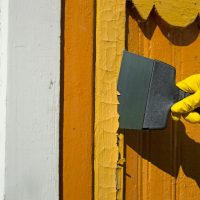Lead Paint Disclosure Requirements for New York Landlords

Lead paint can pose serious health risks to young children. In response to this danger, federal, state, and local laws have imposed strict lead paint disclosure and remediation requirements on landlords in New York. Failing to comply with these regulations can lead to significant legal and financial consequences. Here’s what New York landlords need to know about lead paint disclosure requirements. If you find yourself facing a lead paint lawsuit as a New York building owner, landlord or property manager, contact the Law Offices of Richard A. Fogel, PLLC, for advice and representation from an experienced and successful New York lead paint defense lawyer.
Federal Lead Paint Disclosure Requirements
Under the federal law Residential Lead-Based Paint Hazard Reduction Act of 1992, also known as Title X, landlords of residential properties built before 1978 must:
- Disclose known lead-based paint hazards to tenants before leasing or renewing a lease.
- Provide tenants with the EPA’s “Protect Your Family From Lead in Your Home” pamphlet.
- Include lead paint disclosure language in lease agreements.
- Allow tenants to inspect the property for lead hazards.
Failure to comply with federal lead disclosure laws can result in significant fines and liability for health-related damages.
New York State Lead Paint Regulations
New York State has its own set of disclosure laws designed to protect children from lead in their residential environments. Any known lead-based paint in pre-1978 housing must be disclosed to buyers or renters by property sellers and landlords, respectively. Contractors performing any work on pre-1978 homes must be EPA-certified and utilize work practices specifically designed to prevent lead exposure.
Generally speaking, New York landlords are required to maintain safe conditions, which could include remediating lead-based paint hazards and civil liability for failing to do so. In New York City, however, the rules and requirements for landlords are spelled out in greater detail. Moreover, “not knowing” of any lead paint hazard is not a defense to liability if lead paint is found in the apartment.
New York City’s Local Lead Paint Laws
New York City has particularly stringent lead paint regulations under Local Law 1 of 2004. Key requirements include:
- Annual lead paint inspections in apartments where a child under six resides. Landlords are responsible for determining whether a child under six resides in the building by sending an annual survey to tenants inquiring about children under six in the household and must maintain these records for random audit.
- If peeling paint or another lead paint hazard is found, landlords must remediate the hazard within 21 days. Remediation in an unoccupied unit must also occur before a new tenant occupies the apartment, regardless of the age of the occupant.
- Landlords must annually provide the federal lead paint pamphlet to tenants.
- Certification of lead-safe work practices for abatement.
- Vacant apartments must be tested and abated of lead paint
Failure to comply with Local Law 1 can lead to fines and more importantly, seven-figure lawsuits from tenants. The New York City Department of Housing Preservation and Development (HPD) and the New York City Department of Health (DOH) actively enforce these regulations, and HPD conducts random audits of paperwork to ensure compliance.
Legal Consequences for Non-Compliance
Landlords who fail to meet lead paint disclosure and remediation requirements face legal and financial risks, including:
- Fines and penalties from federal, state, and local agencies.
- Seven-figure civil lawsuits from tenants for lead poisoning-related damages.
- Loss of rental income if properties are deemed unsafe for habitation.
Protecting Your Interests as a New York City Landlord
To ensure compliance with lead paint disclosure laws, landlords should ensure they work with certified lead abatement professionals for any required work and maintain detailed records of lead inspections, remediation, and tenant notifications. They should additionally consult an experienced lead paint defense attorney to stay up to date with state and local regulatory changes and handle any lead paint compliance issues or litigation that arises.
The Law Offices of Richard A. Fogel, P.C. advises landlords on lead paint litigation defense, and insurance coverage issues related to toxic exposure liability. If you have questions about your legal obligations or need representation in a lead paint-related dispute, contact our firm for guidance.
